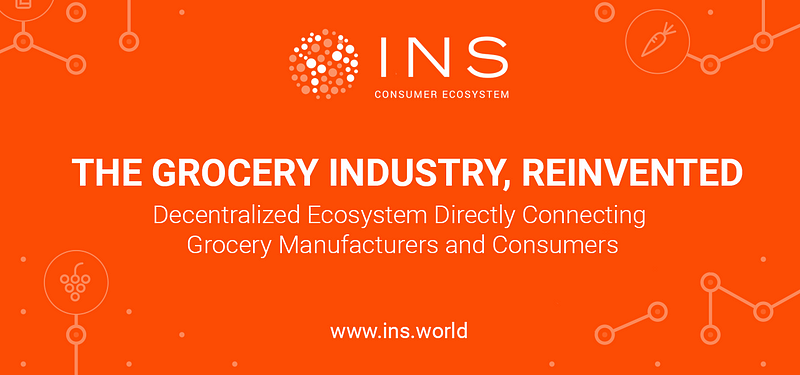
The INS ecosystem will become the first global decentralized grocery marketplace where consumers can buy products directly from manufacturers, enjoy low transparent prices for a wide range of high quality products, and save on direct promotions. Manufacturers compete for consumers and interact with them directly.
Comparison with competitors
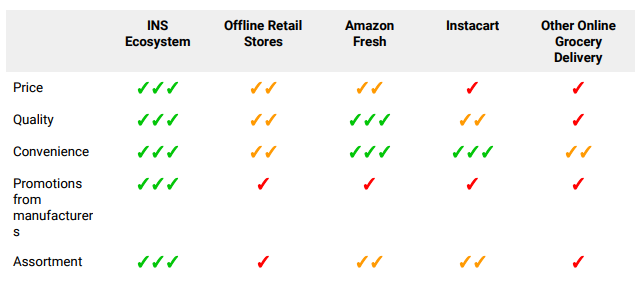
To become an ecosystem participant, the user creates an account on the INS platform. During the registration, the system will create a user profile and a wallet. Each participant of the ecosystem will be provided with a wallet that preserves all data in the decentralized database and interact with other parties, utilizing smart contracts. We plan to place the INS token on
cryptographic token exchanges, giving an opportunity to openly buy them (to residents of countries where the purchase of digital tokens does not violate local laws)
Mission
To Create the leading decentralized consumer marketplace used by broad audiences by maintaining a thriving ecosystem of consumers willing to buy everyday products at lower prices and manufacturers looking to sell directly and surpass existing retail chains.
ECOSYSTEM PARTICIPANTS
The ecosystem will be built in accordance with a scalable and decentralized approach that ensures stability and sustainability in the long term. The ecosystem will involve the following participants, which will participate as depicted in the next diagram:
● Platform
● Consumers
● Manufacturers
● Fulfillment (fulfillment center operators and workers, couriers)
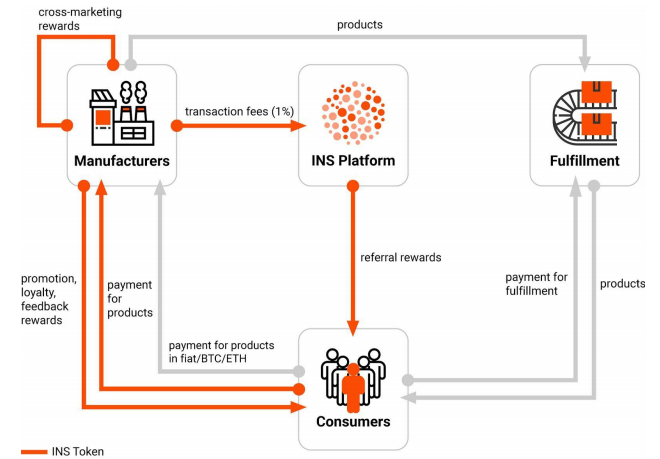
PLATFORM
The INS platform is a decentralized marketplace that allows manufacturers to join, publish their products for sale, carry out promotion and loyalty campaigns, and get feedback from consumers. It enables consumers to order those products and facilitates the order fulfillment process.
INS roles include:
● INS token creation and the token launch to fund development and expansion
● Establishment of a decentralized, fair and secure model for order execution
● Development of smart contracts to run the order payment and fulfillment process
● Release of the customer website and app, fulfillment app for fulfillment center workers and couriers, and web interfaces for manufacturers and fulfillment center operators
● Creation of an effective incentive model for all parties to join the INS ecosystem
● Development of an active marketing campaigns to ignite initial traction
● Elaboration of the ecosystem’s regulatory aspects
MANUFACTURERS
Manufacturers are companies or individuals in the business of fresh produce, groceries and consumable household items. They range from local farmers to large multinationals, such as Procter & Gamble, Unilever, Coca-Cola, etc.
Manufacturer roles include:
● Publish products
● Deliver products ordered by consumers to fulfillment centers
● Promote the INS ecosystem by bringing traffic via promotions of derived apps
CONSUMERS
Consumers are individuals or companies that want to buy online high-quality groceries at cheaper prices. Orders can be placed via the INS website, INS app or custom apps derived by manufacturers from the app reference implementation.
Consumer roles include:
● Search products listed by manufacturers, make orders and pay for them 17
● Participate in feedback requests
● Receive promotion, loyalty, referral and feedback rewards
FULFILLMENT
FULFILLMENT CENTER OPERATORS
Fulfillment center operators are owners or lessees of existing warehousing facilities and/or delivery fleet. They provide the space where workers take products delivered by manufacturers and assemble orders. INS will engage independent fulfillment center operators to join the ecosystem to ignite fast geographical expansion.
FULFILLMENT CENTER WORKERS
Fulfillment center workers, employed by a fulfillment center operator or acting as independent contractors, will follow instructions received via the INS fulfillment app to:
● Collect products delivered by manufacturers to fulfillment centers
● Assemble products into orders
● Pass assembled orders to couriers
INS will seek to attract independent workers to join the ecosystem.
COURIERS
Couriers, employed by a courier company or acting as independent contractors, will follow instructions received via the INS fulfillment app to:
● Pick up orders from fulfillment centers
● Deliver orders to consumers
INS will seek to attract independent couriers and courier companies to join the ecosystem.
BLOCKCHAIN & SMART CONTRACTS
Blockchain is a shared-database technology, mostly popular for underpinning bitcoin digital currency. It works with linked databases that update digital ledgers unceasingly. Smart contracts are self-executing contracts with the terms of the agreement between buyer and seller being directly written into lines of code. The code and the agreements contained therein exist across a distributed, decentralized blockchain network.
Smart contracts permit trusted transactions and agreements to be carried out among disparate, anonymous parties without the need for a central authority, legal system, or external enforcement mechanism.They render transactions traceable, transparent, and irreversible. The INS platform is designed as a very high-load system. The market potential for the INS ecosystem consists of billions of users, each of them making dozens of orders per year.
The main focus is on performance, in which we seek smart contracts support, predictability, stability,and ease of use. We plan to use the most proven and scalable open source technologies and constantly monitor alternative technical implementations.As the existing blockchain platforms such as Ethereum have inherent limitation in transaction bandwidth (currently limiting to a dozen tx/sec), and prospective platforms and frameworks are only in the development stage, we also consider designing and developing our own INS blockchain platform in the future, where nodes are selected from a semi-trusted set of supporters.
Given the trust in the nodes, we will implement one of much faster consensus algorithms from the BFT family (HoneyBadgerBFT/Zyzzyva/others), enabling up to thousands transactions per second.A smart contract virtual machine will run on top of the consensus algorithm. The state of the INS blockchain will be regularly anchored to the most popular smart contract ledgers (at least ETH) so that proofs of state and proofs of transaction (within INS) can be verified by Ethereum smart contracts (like it is currently done in BTCRelay or will be done in the future in Plasma). Common optimization techniques such as state sharding and payment channels will be also implemented.
BLOCKCHAIN APPLICATIONS IN INS
● Smart contracts
● Payments
● Supply chain management
SMART CONTRACTS
Blockchain and smart contracts provide the tools and framework to create a new generation of marketplaces where supply and demand sides can engage in trusted trading transactions,according to various business rules, without the need of a central brokerage entity.
Consequently, the same way online marketplaces disrupted many traditional brick and mortar businesses, blockchain and smart contracts will give birth to a new kind of peer-to-peer marketplaces that will unsettle the current ones. INS will provide a number of smart contract templates that will be used to facilitate the sale mechanism.
The peer-to-peer structure is the perfect fit for the decentralized nature of the INS ecosystem and has the benefit of handing over the power back to the people participating in the ecosystem.
PAYMENTS
The payment process in e-commerce currently entails more than 10 different steps to settle a transaction and up to 15 separate fees to pay for payment gateways, thus making transaction fees range from 2% to 6%, a long route that could be cut short with blockchain use.
Blockchain is the perfect tool for ecommerce to be more efficient and more trustful. Payment processing through blockchain has a significantly bigger potential for transaction high speeds and low prices, let alone all the possible variety of ways smart contracts can improve both ecommerce
and payments.
A tokenized ledger will provide a complete token-based system, similar to “real”money where tokens are sent and exchanged at different times and for different reasons, based on predefined rules and events.
SUPPLY CHAIN MANAGEMENT
E-commerce companies must manage a complex supply chain of manufacturers, third-party vendors, carriers and logistics providers. A blockchain of the transaction, containing order details and negotiated fees and commissions (in the form of smart contracts) will be used to capture documents, delivery and possible return events, and drive financial settlement with fewer opportunities for dispute.
The public-private nature of blockchain records means that each party can make data visible to the others. All parties have visibility into the transaction and no custom interface has to be negotiated between partners (only to/from the blockchain).
The blockchain is the system of record for the entire transaction. It doesn’t merely record the transaction, it drives the whole process. This will reduce time delays, added costs and human errors that plague transactions today, automate inventory control, and streamline fulfillment processes, but errors to some extent are possible since grocery products are not digital, the blockchain records of their track is inevitably post-factum.
PRODUCTS
Products in the consumer markets constitute the basic item that actions revolve around. To make it simple and convenient, products on the INS platform are required to have several defined parameters, such as name, category assignment, volume, price, description, ingredients, etc. that makes it easy to find and choose products for ordering.
PLACING ORDER
Consumers choose products to buy, specify delivery details, and pay in fiat, BTC, ETH or INS tokens. Depending on the payment method, consumers will be eligible to different prices and rewards.

Consumer can order products using the official INS website, the official app or a derivation of the official app released by a specific manufacturer.
PRODUCT SEARCH
The decentralized file storage network (we explore different options from IPFS to Storj) is used to maintain up-to-date databases of products listed by manufacturers.
Consumers can apply sorting and filters to choose what they want to buy. Manufacturers may distribute proprietary apps derived from the reference implementation, in which they can choose specific sorting methods and filters for products.
68% of consumers that shopped online say they are very likely to switch grocers for a better online shopping experience (quick, easy, convenient, enjoyable) .
Browsing tens of thousands of products online can be very daunting for consumers, so we will make it as easy as possible for them to find the products that they love. For instance, we will provide catalogue filters for item attributes such as Local, Gluten-Free, Organic and On Sale.

We will use the 1-to-1 personalization right from the homepage where consumers should feel that the experience has been tailored specifically to them.
Consumers will see their previous orders, have access to their most frequently purchased items, and be shown products and specials that are relevant based on their shopping history.
The 1-to-1 personalization will extend to search results, the products displayed at the top of each department, product recommendations in the cart, and daily/weekly offers.
REWARDS
Today’s consumers have a range of choices about where to shop, and sellers need to work hard to earn repeat business. Rewards and discount programs give customers more reason to come back again, especially in the competitive grocery market. In the INS ecosystem, manufacturers will be able to apply any logic in the smart contract to create bespoke reward programs according to their needs.
LOYALTY
Loyalty reward mechanisms is one of the best ways for manufacturers to easily set up a loyalty program to reward long-term customers. Payments are processed by smart contracts making it possible to proof that a consumer is eligible for a reward.
Manufacturers set the rules such as reward type, expiration date, product lists that the reward can be spent on, amount, etc. Loyalty reward instruments will be coded in a smart contract, which accepts reward funds from the manufacturer and distributes them to those who provide proofs of eligibility linked to consumer wallets.
PROMOTION
Automated promotion reward mechanism is built to incentivize consumers to make a first order. Promotion reward mechanism will be coded in a smart contract, where manufacturers set the rules (expiration date, list of products, customer parameters, etc.) and deposit tokens that can only be used to buy pre-defined products during a limited period of time.
CROSS-MARKETING
Cross-marketing mechanism will be used by manufacturers to promote products to new audiences and generate more sales. Manufacturers can find partners — other manufacturers that created custom apps and sell complementary products, and cross-promote each other.
Cross-marketing reward instruments will be coded in a smart contract, where the product details and reward rules are specified. The cross-marketing mechanism intends to incentivize manufacturers to share app traffic with other manufacturers and help consumers discover more products.
REFERRAL
INS will create the INS Reserve Fund as the part of the token generation event with the primary goal to use these tokens as referral rewards to new customers and popularize the INS ecosystem.
FEEDBACK
Manufacturers, seeking to receive direct customer feedback on their products, will be able to incentivise consumers with INS tokens to motivate them to participate. The feedback reward mechanism allows to set a specific set of parameters and create a focus group of consumers from whom a manufacturer wants to receive feedback.
The customer data will not be shared with manufacturers and will initially be processed in a centralized way on the INS platform, but later decentralized as consumers will provide privacy-preserving proofs of eligibility which enable them submitting a feedback without being identified.
MINIMUM BALANCE
Manufacturers will be required to hold a balance in INS tokens equal to some portion of previous month sales to guarantee the ability to pay all types of rewards. Manufacturers can either keep tokens received from consumers or buy tokens on exchanges to comply with the requirement.
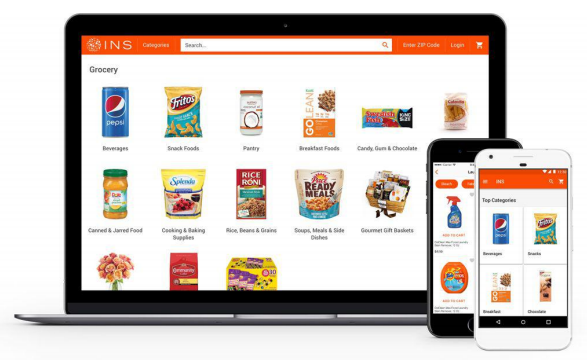
Consumers will shop for groceries and provide feedback on the website or in the apps. The official consumer app implements the consumer side of the model including access to smart contracts and access to products from a decentralized cloud storage.
The app will be published as open source software on GitHub and serve as the formal reference implementation. Manufacturers can alter the official app and release their own branded and customized apps.
We will publish an open source customization software development kit (SDK) with tutorials and documentation to make the app customization process as easy as possible. Customized app implementations are not forks of the INS platform and are not forks of the INS token but simply a different client for the same network.
Road Map
Our roadmap involves many different aspects, such as technology development, operational infrastructure installment, signing partnerships, and launching marketing initiatives. The preliminary roadmap is presented below.
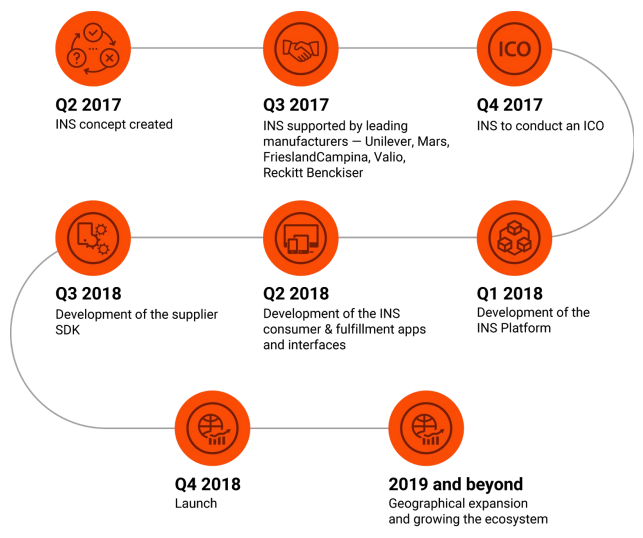
DEVELOPMENT ROADMAP
Our goal is to create the leading decentralized consumer marketplace used by broad audiences by maintaining a thriving ecosystem of consumers willing to buy everyday products at lower prices and manufacturers looking to sell directly and surpass existing retail chains.
Our main role is to develop the open source technology required for running the platform and create a successful model to incentivize all participants.
MANUFACTURERS
The INS ecosystem will benefit from as many high-quality manufacturers joining the ecosystem as possible. Manufacturers are the publishers and providers of products in the ecosystem and serve as engines for driving traffic. Manufacturers consume INS tokens to provide all types of reward programs. Channels for attracting manufacturers include manufacturers who already supported the INS idea, direct contacts with manufacturers, participation in relevant meetings and conferences, forming partnerships with manufacturer associations, and providing guidance and support to new manufacturers interested in joining the ecosystem in order to make the process as seamless as possible.
CONSUMERS
The more active consumers are in the network, the more turnover and the greater the profits will be for manufacturers. Greater turnover increases the ecosystem value. Channels for increasing the consumer base include marketing and promotion of the INS apps and website to broader audiences and promotion of the online grocery delivery in general. Attracting more consumers is not the only avenue of growth; improving engagement of existing customers is equally important. Customer retention in the network can be increased by ongoing improvement to the core product.
INS TOKEN
STRUCTURE
After the ICO period, all contributors will receive an ERC20 exchangeable INS tokens on the Ethereum network. Whenever the INS blockchain is launched with its own token mechanism, the ERC20 token will be always accepted for exchange to a new token 1-to-1.
The INS token is a core component of the INS ecosystem and is designed to facilitate all kinds of operations that make the token an integral part of the ecosystem and the driver for its economy. The INS token is fractionally divisible, transferable and fungible.The token balances and transfers will be tracked by INS.
In the case of any force majeure, such as large token theft, contract compromise, or a disrupting change of Ethereum protocol, INS may opt to freeze token transfers and issue a new token contract with balances replacing that of the original token registry by certain date. In the case of an Ethereum fork, INS will properly announce which branch it will support.
USAGE
The INS token is planned to be the only means of exchange for handling all types of rewards and one of the means of payment within the INS ecosystem. We plan that INS tokens will be accepted as a payment method in partner services.
INS TOKEN USAGE
Manufacturers
● Rewards: loyalty, promotion, cross-marketing, feedback
● Minimum balance hold
Consumers
● Payment for orders INS
● Referral rewards to consumers
ADOPTION
One of our key goals is the introduction of a decentralized consumer marketplace to audiences that have little experience with cryptocurrencies and likely to have little-to-no knowledge of blockchain-based technologies. The INS ecosystem will be expanding beyond the crypto community and focusing its activity on the broad audiences.
Providing services to this audience requires perfect knowledge of the grocery industry and its specifics. Given extensive industry experience, our team knows exactly what consumers want. We will make it very simple and straightforward for consumers to buy, earn and use INS tokens. The
complexities of opening and maintaining a cryptocurrency wallet will be made seamless in the INS website and apps.
TOKEN SALE
SUMMARY
Start date: 11:00 AM (GMT) on DECEMBER 4, 2017
Payment methods: BTC, ETH, LTC, DASH, USD (bank transfer)
Soft cap: 20,000 ETH
Hard cap: 60,000 ETH
Token exchange rate: 1 ETH = 300 INS tokens
Total token supply (max): 50,000,000
Min purchase: 0.1 ETH
Bonuses:

● No token creation, minting or mining after the end of the ICO period
● Tokens will be transferable once the ICO is completed
● If the soft cap is not reached, funds will be returned to the participants
● Upon reaching the hard cap, the ICO will end immediately
The token distribution is proportional to the number of INS tokens generated:

● Advisors’ and early supporters’ tokens are locked for 6 months
● The Reserve Fund’s tokens distribution will start in 2019 and last for up to 2 years with the primary goal to incentivize new customers to join and accelerate adoption of the INS ecosystem by broad audiences
BOUNTY & REFERRAL CAMPAIGN
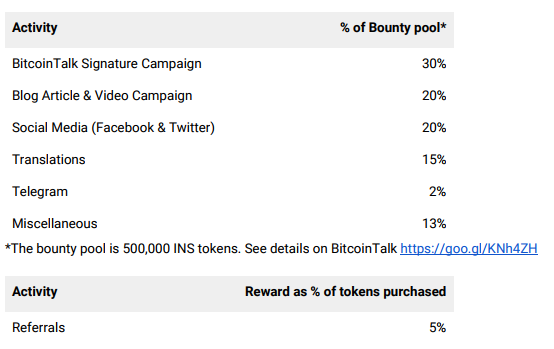
Referral reward to a referral link owner is 5%, based on the number of tokens purchased using the referral link. Those who bought tokens using a reference link receive an extra 3% bonus. At the end of the ICO all sold tokens are considered to be 60% of the total supply, 15% is distributed to the INS team, 5% — to advisors, early supporters and bounties receivers. The remaining 20% of tokens will be held in the Reserve Fund. Tokens from the Reserve Fund will be used wisely to reward new customers to join the ecosystem and accelerate adoption.
TOKEN SALE PROCEEDS
The funds raised during the ICO are planned to be used in accordance with the roadmap.
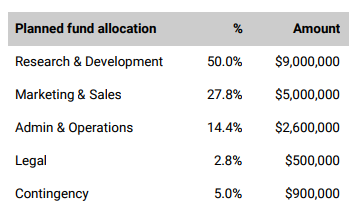
Our roadmap assumes development of all features for the INS platform and feature-rich apps and interfaces for all ecosystem participants, as well as a strong sales and marketing support to accelerate adoption by manufacturers and consumers.
Research & Development costs cover all R&D expenses, including design and development of smart contracts, cryptographic mechanisms, the INS platform, apps and interfaces, SDK, etc. Includes opening of an R&D center with approximately 35 engineers.
Admin & Operations costs include salaries of all INS employees excluding the R&D team. Marketing & Sales budget will be allocated on acquisition of both manufacturers and consumers.
Legal costs include all legal expenses associated with expansion of the INS ecosystem in different countries. Contingency fund is calculated as 5% of the total budget.
ESCROW
All payments received for INS tokens in connection with the INS token sale will be held in escrow in a multi-signature wallet. Keys will stay with the INS team and Nektorov Saveliev & Partners, a cross-border provider of legal services and member of Yingke, Asia’s largest global legal services network. NSP has partner offices in over 30 countries, including China, the UK, Switzerland and Italy.
INS PROMO TOKEN (INSP) AIRDROP
500,000,000 INSP tokens airdropped to all Ethereum addresses with >=0.1ETH. A snapshot of ETH token holders was taken on November 1st. INSP token provides an additional 5% bonus to purchase INS tokens during the Token Sale. INSP is a promo token and can not be exchanged into INS token.
INSP Token Airdrop Goals:
● A fair, equal opportunity for many different people to get involved
● Facilitate activity and capture a wider audience Airdrop recipients do not need to do anything to receive the INSP tokens. Ignore any requests for your private keys.
TEAM & ADVISORS
INS founders, Peter Fedchenkov and Dmitry Zhulin, have known each other since 2010 and work together since 2013. INS is supported by world-renowned advisors.
SELECTED TEAM EXPERIENCE
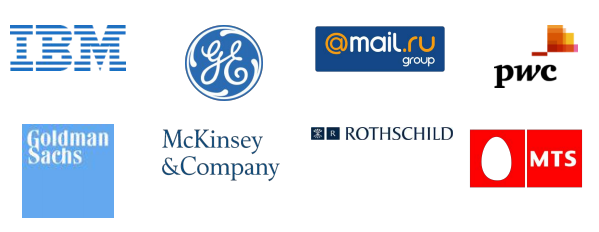
ADVISORS
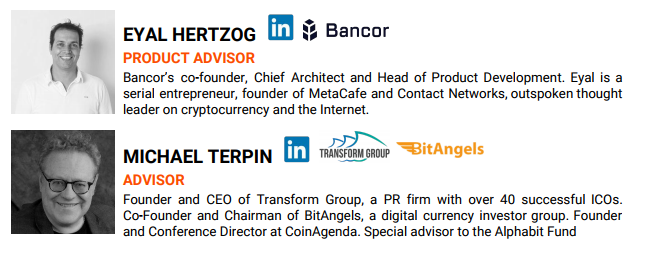
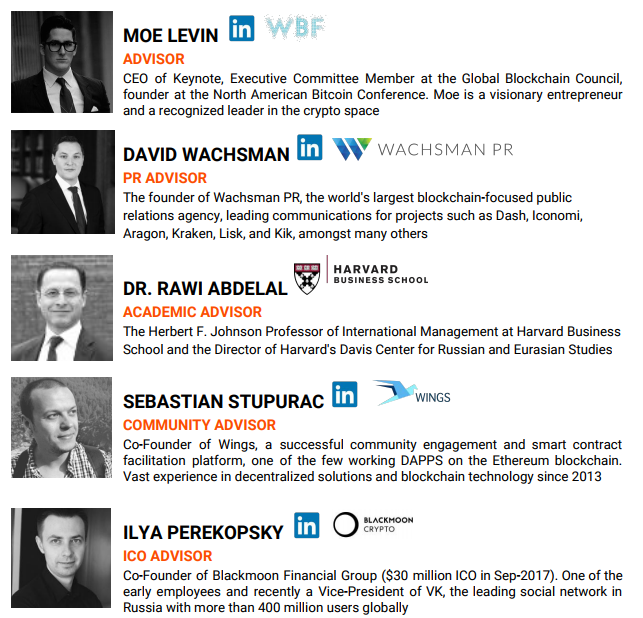
CORE TEAM
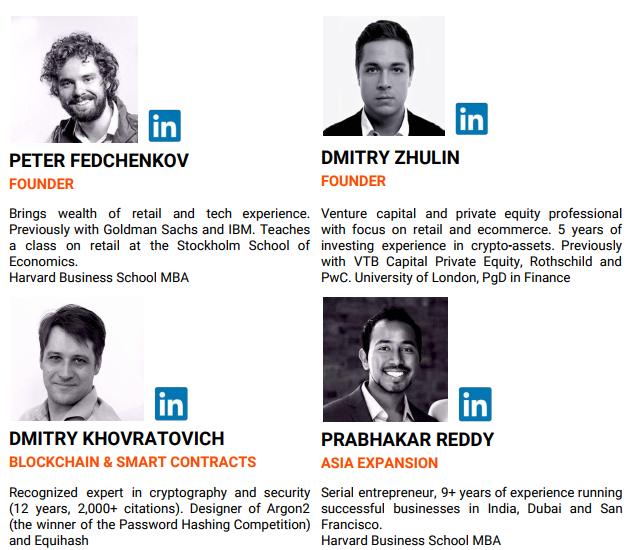

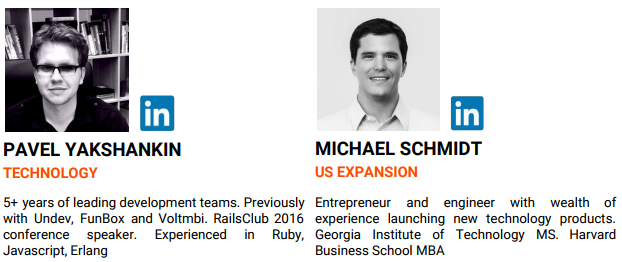
Details Information :
Website :https://ins.world/
Whitepapper :https://ins.world/INS-ICO-Whitepaper.pdf
Telegram :https://t.me/joinchat/BxVKx0P0NsAeSZs1EPZ9Sg
Facebook :https://web.facebook.com/ins.ecosystem/?_rdc=1&_rdr
Twitter :https://twitter.com/ins_ecosystem
Profile Bitcointalk :https://bitcointalk.org/index.php?action=profile;u=1109350
Eth :0xaFA49103b15834D6bCF6ac5a2664b0c85e379b4E




Tidak ada komentar:
Posting Komentar